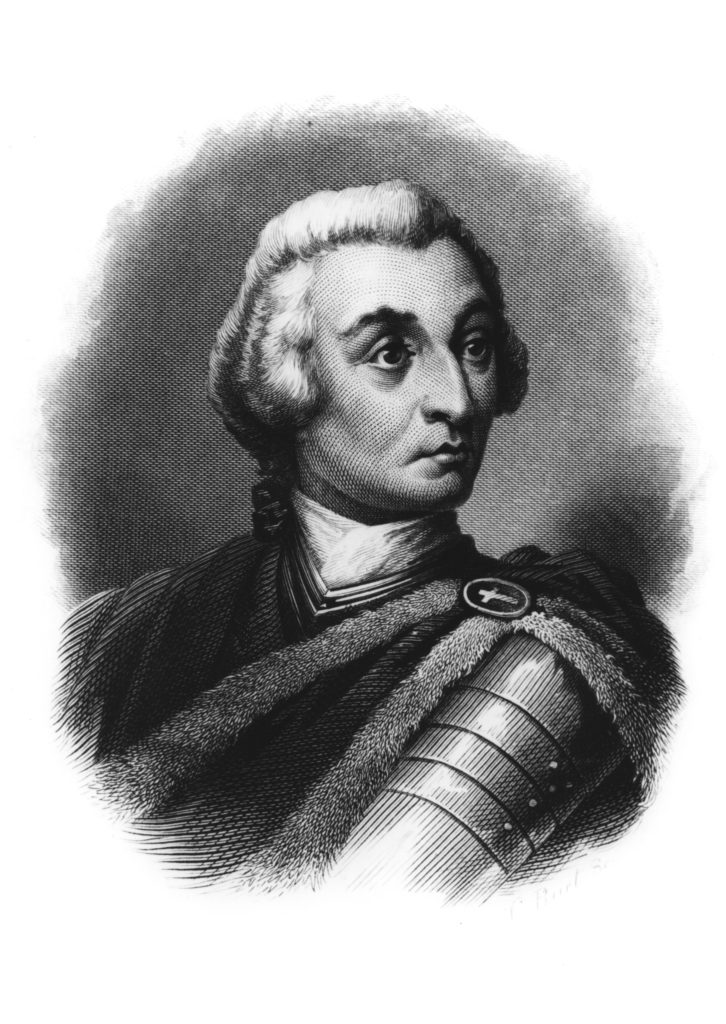James Edward Oglethorpe
Who was James Edward Oglethorpe?
James Edward Oglethorpe, founder of the colony of Georgia, was born on December 22, 1696, in Yorkshire, England. After graduating from Eton and Corpus Christi College, Oxford, Oglethorpe began a military career in 1717, fighting against the Turks under Prince Eugene of Savoy.
Championing the Oppressed
From 1722 to 1743, Oglethorpe served in the British House of Commons, gaining a reputation as the champion of the oppressed. He pressed for the elimination of English prison abuses and, in 1732, defended the North American colonies’ right to trade freely with Britain and the other colonies.
Founding a Colony
The prison reforms Oglethorpe had championed soon inspired him to propose a charity colony in America. On June 9, 1732, the crown granted a charter to the Trustees for Establishing the Colony of Georgia. Oglethorpe himself led the first group of 114 colonists on the frigate Anne, landing at the site of today’s Savannah on February 1, 1733. The original charter banned slavery and granted religious freedom, leading to the foundation of a Jewish community in Savannah.

The Battle of Bloody Marsh
In 1742, Oglethorpe called upon his military experience and Georgia’s fledgling militia to defend the colony from a Spanish invasion on St. Simons Island. Oglethorpe and his militia defeated the invaders in the Battle of Bloody Marsh, which is credited as the turning point between England and Spain’s fight for control of southeastern North America.
An Opponent of Slavery
In 1746, Oglethorpe was falsely accused of treason by a disgruntled military officer and driven from public life, although he retained his title as general and, at the time of the American Revolution, was the senior officer in the British Army. He did not publicly comment on the war, but in private, he tried to convince the government to negotiate a truce in 1777-1778. Throughout his life, Oglethorpe remained an outspoken opponent of slavery in the colonies.
“Great Esteem”
At the age of 88, the General died at Cranham Hall on June 30, 1785. Three weeks before his death, he called on John Adams, newly appointed ambassador to England from the United States of America, to express his “great esteem and regard for America”—the new country in whose creation he had played an important role.
How Does OU Pay Homage to its Namesake?
Thornwell Jacobs, the president of Oglethorpe University for nearly three decades, intended for the new campus to be a “living memorial” to James Oglethorpe.
Oglethorpe Day
Held on the second Wednesday in February, Oglethorpe Day annually commemorates the anniversary of General James Edward Oglethorpe’s arrival in the New World in Savannah, GA. Oglethorpe Day celebrations include the spirited “Petrels of Fire” race on the quad, an esteemed guest speaker, and other Oglethorpe-related activities throughout the day.
Nescit Cedere
The Oglethorpe University motto, Nescit Cedere, a Latin phrase pronounced “NES-keet KEH-deh-reh,” was adopted from the Oglethorpe family crest as the University’s motto. It translates as “one who does not know (how) to give up” and perfectly captures the pride and tenacity of the Oglethorpe community.
Gothic revival architecture
The distinctive Gothic revival architecture of the buildings on the main quad of the Oglethorpe campus was inspired by the honorary alma mater of James Oglethorpe, Corpus Christi College, Oxford.
Battle of Bloody Marsh
Each year, a team of students and a team of faculty and staff meet to do battle…via tug-of-war. The annual “Battle of Bloody Marsh” is named for the famous 1742 battle in which General Oglethorpe’s forces defeated the Spanish troops in South Georgia.
Mascot: the Stormy Petrel
Oglethorpe University’s mascot is the Stormy Petrel, affectionately called “Petey” by our students. This unusual mascot – a small, persistent seabird, according to legend, had inspired James Oglethorpe while on board a ship to Georgia in 1732. The Oglethorpe University nickname “Stormy Petrels” is unique in intercollegiate athletics.

